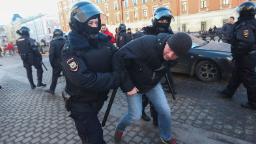
New York (CNN Business)A version of this article first appeared in the Reliable Sources newsletter. Here you can register for free.
Protests were documented in dozens of Russian cities on Sunday – risky actions against a war that Russians should not call “war.”
OVD-Info, an independent monitoring group that tracks arrests in Russia, reported that at least 4,640 people were arrested during protests in 147 cities. The Russian state news agency TASS put the number of arrests at 3,500, citing the Russian Interior Ministry.
News reports of the protests have been limited due to a new Russian law criminalizing journalism in the country. But some photos and videos were still available – and that’s the point I want to underline.
Vladimir Putin and his allies are building digital and legal walls to protect Russians from the truth. People in other countries are also feeling the consequences – like the sudden lack of live reports from Moscow. The crackdown that began on Friday remained in effect through Sunday. But history teaches us that information almost always finds a way out.
Well, that doesn’t always mean people will be able to enter it. If you live in Russia, “you have to make a lot of effort to find out what’s really going on in Ukraine”. Julia Ioffe told me in “Reliable Sources” on Sunday. “If you only watch state television, everything is going great, there are no refugees fleeing the ‘liberating’ Russian army, nobody is bombing civilian homes,” and so on.
Furthermore, access to information does not mean that people will plot thereon. Or that it will believed. The New York Times’ Valerie Hopkins publishes a new story about the confusing experience of Ukrainians finding relatives in Russia “don’t believe there’s a war at all.” “These relatives essentially bought into the official Kremlin position,” Hopkins wrote. As we have documented, Russian propaganda is incredibly compelling to some viewers.
But facts still emerge, whether it’s digital walls or wild counter-programming. Even as Putin attempts to turn Russia into a “sealed space,” as Thomas Friedman put it in Reliable, the world still gets glimpses of the space…
Insights from the CPJ guide
Robert Mahoney, executive director of the Committee to Protect Journalists, said he follows numerous reports of local journalists being arrested while trying to cover protests in Russia. Locals “can’t cover the war anymore, they can’t call a war a war anymore, and many of these independent journalists have fled to neighboring countries,” he said. “One of them I spoke to today basically said ‘the Russian media is dead’.”
But some still try. And others who have fled will need help setting up “exiled newsrooms,” Mahoney said. Independent journalists in Ukraine, meanwhile, are in urgent need of protective gear and other supplies, he added. Watch the “A Block” conversation with Mahoney, Ioffe and Friedman here…
The situation in Moscow
No major US or UK network aired live reports from Moscow over the weekend. On Saturday, US-funded Radio Free Europe/Radio Liberty joined other news outlets to halt its operations in the country, saying the new law was just one of the factors. More specifically, RFE/RL said: “Local tax authorities initiated bankruptcy proceedings against RFE/RL’s Russian company on March 4, and the police increased pressure on its journalists.”
“This is not a decision that RFE/RL made of its own accord, but one that was forced upon us by the Putin regime’s attack on the truth,” RFE/RL CEO Jamie Fly said in a statement. Fly added: “Despite this somber moment, we know from our organization’s 70-year history that one day, perhaps sooner than many think, we will be able to re-open an office in Russia. Time is on the side of liberty, even in Vladimir Putin’s Russia.”
>> Also notable: BBC World News, the broadcaster’s global TV news channel, has been “shut down in Russia…”
The view from Ukraine
British front pages on Monday showed harrowing photos from Irpin, outside Kyiv, showing civilians running for their lives amid Russian shelling. CNN’s live updates page sheds light on another angle from inside the country: “Growing resistance in Russian-held Ukraine.”
“In recent days, popular resistance to Russian forces has grown,” said CNN’s Tim Lister and Olga Voitovych, particularly in southern Ukraine, where there have been several protests in areas where Russian troops have arrived. More here…
View the war through drinking straws
During the 2003 invasion of Iraq, some embedded reporters noted that they were seeing the war through a straw, meaning a narrow slice of history. Today, thanks to social media, camera phones, and other technologies, journalists have a handful of straws. But the point remains the same: the view of the battlefield is limited.
“One side, Russia, is opaque,” CNN’s Jim Sciutto told me Sunday from Lviv, Ukraine. There are no journalists in the Russian Armed Forces, and officials “deliberately lie: they hide losses, they hide losses of equipment”.
“On the Ukrainian side, we have more vision,” Sciutto said, “because they are sharing more images, but we also have to acknowledge that they are also in the midst of an information war.” Propaganda is part of a war.” So Ukrainian officials emphasize the positive aspects of their side and downplay the negative ones.
“Then we have our people, especially CNN, spread across the country,” he said, “often putting themselves and their teams at great risk, giving you multiple soda straws,” multiple data points. The result: “It takes that humility to make a judgment about where this conflict stands on any given day,” Sciutto said, “because we don’t know the whole picture.” Ramishah Maruf has a synopsis of the segment here…
Add Comment